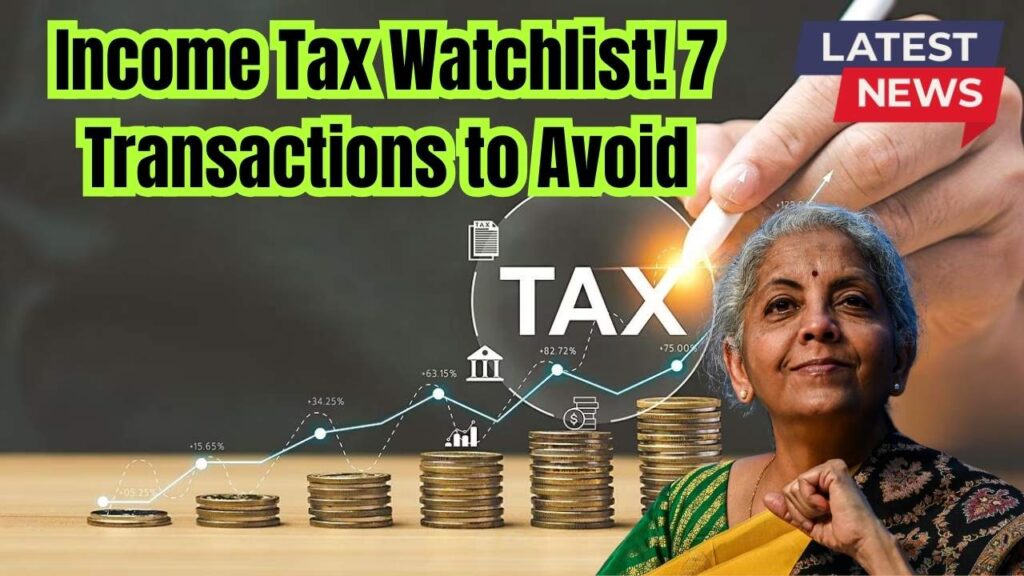
When it comes to your financial activities, the Income Tax Department is keeping a watchful eye—especially on certain high-value transactions. If you cross specific limits without proper disclosure or documentation, you may receive a notice that can trigger audits or deeper scrutiny.
In this article, we break down the 7 key transactions that can prompt an income tax notice, explain the legal framework, and offer practical advice to stay compliant. Whether you’re a salaried employee, a business owner, or a student, this guide will help you navigate the complexities with ease.
Income Tax Department May Send Notice for These 7 Transactions
| Transaction Type | Threshold Limit | Reported By |
|---|---|---|
| Cash Deposit in Savings Account | ₹10 lakh in a financial year | Banks |
| Cash Deposit in Current Account | ₹50 lakh in a financial year | Banks |
| Credit Card Payments | ₹1 lakh in cash or ₹10 lakh total/year | Banks |
| Foreign Travel Expenses | ₹2 lakh per financial year | Banks/Credit Card Companies |
| Property Purchase/Sale | ₹30 lakh or above | Registrar/Sub-registrar |
| Investment in Mutual Funds/Bonds | ₹10 lakh or more | Asset Management Companies |
| Cash for Credit Card Bill | Over ₹1 lakh per annum in cash | Banks |
The Income Tax Department uses technology and real-time data sharing to track your financial transactions. While there’s no need to fear if you’re honest and compliant, being aware of the 7 key transactions that can trigger a notice helps you stay ahead of any tax-related surprises.
Stay informed, monitor your financial footprint, and always file your ITR accurately.
Legal Framework: Why These Transactions Are Flagged
Under Section 285BA of the Income Tax Act, specified entities (like banks, mutual fund houses, registrars, etc.) are obligated to report certain financial transactions to the government under SFT (Statement of Financial Transactions).
The data reported forms part of your Annual Information Statement (AIS) and Form 26AS, both available in your Income Tax e-filing portal.
These statements are the starting point for any notices if discrepancies are found between reported income and actual financial activity.
How Does the Income Tax Department Send Notices?
The department sends notices through:
- Email to your registered email ID
- SMS on your linked mobile number
- E-filing portal dashboard
Types of notices you may receive:
- Notice under Section 143(1) – For discrepancy in returns
- Section 139(9) – Defective return
- Section 148 – Reassessment due to unreported income
Real-Life Example:
Let’s say Mr. Sharma earns ₹10 lakh annually. However, he:
- Deposits ₹12 lakh in cash to his savings account,
- Makes a foreign trip costing ₹3 lakh, and
- Invests ₹15 lakh in mutual funds.
Despite his income level, these transactions raise a red flag. If these aren’t justified with proper documentation, Mr. Sharma is likely to receive a tax notice.
How to Monitor Your Financial Footprint
Check your Form 26AS and AIS regularly to see:
- Reported transactions by banks and third parties
- TDS/TCS deductions
- Property purchases
- Share market/mutual fund activity
Penalties for Ignoring or Misreporting Transactions
- Penalty under Section 271FAA: ₹500 per day for incorrect reporting
- Underreporting Income: Penalty can go up to 50-200% of the tax amount due
- Prosecution: In extreme cases, it could lead to prosecution under Section 276C
How to Respond to an Income Tax Notice
- Don’t Panic – Notices are often requests for clarification.
- Login to the E-filing Portal – Check the exact nature of the notice.
- Submit a Response within the deadline (usually 15–30 days).
- Attach Supporting Documents – Income proofs, bank statements, etc.
- Seek Professional Help – Consult a Chartered Accountant if unsure.
Zero Toll Tax: Government’s New Toll Tax Rule, Are You on the Exempt List?
Big Change: Income Tax Bill 2025 to Tax Farming & Dairy Earnings!
Big Traffic Rule Update! Fines Hiked 10 Times – See Latest Challan Rates
Tips to Stay Compliant and Avoid Notices
- Maintain records of all large financial transactions.
- Avoid high-value cash transactions – use banking channels.
- File accurate ITRs based on Form 26AS and AIS.
- Disclose all income sources including gifts, investments, and capital gains.
- Use PAN for transactions above limits – Mandatory in most cases.
FAQs – Frequently Asked Questions
Q1. Can I receive a notice even if I filed my ITR?
Yes. If your transactions don’t match the reported data in AIS/Form 26AS, a notice may still be issued.
Q2. What is the best way to avoid an income tax notice?
Ensure all high-value transactions are reported and justified through your ITR. Match your reported income with financial activities.
Q3. Are UPI and online payments also tracked?
Yes. UPI, NEFT, and IMPS transactions are monitored if they cross certain thresholds or are linked to large purchases.
Q4. Is it illegal to deposit more than ₹10 lakh in cash?
No, but it must be justified and supported by income documents. Large cash deposits without source can attract scrutiny.
Q5. Do students or housewives need to worry about notices?
If they make large transactions, yes. Any unexplained high-value activity can attract a notice regardless of employment status.







